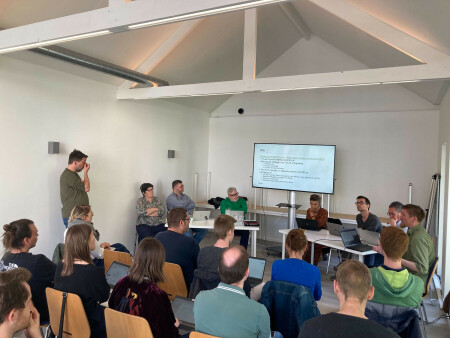Open Cultural Data Bootcamp 2022 report
- Record
In May 2022, we held an anniversary edition of the Open Cultural Data Bootcamp. For the fifth time in a row, we welcomed a whole host of cultural heritage sector partners – but in person again this time – for five packed days. They returned home afterwards full of new knowledge about open cultural data and how to apply it within their own organisation and sector.
The principles of open cultural data are that it needs to be usable, open, linked, accessible, visible and findable. In addition to our participants becoming familiar with these principles on this bootcamp, we also wanted to pay attention to the digital infrastructure required to be able to implement them.
Programme
No more webinars! We were finally able to welcome our participants back to the meemoo office in Ghent in person again, where they learned about the various open cultural data principles and how to apply them in their own organisations. A good digital infrastructure is needed for this. Together with the participants, we therefore looked at the various components that make up this digital infrastructure and how best to organise them. We also discussed the importance of a digital strategy in detail.
Alongside our colleagues, we welcomed a number of guest speakers:
Usable: KMSKA – Royal Museum of Fine Arts Antwerp (Maaike De Prins);
Open: CoGhent (Sofie Teugels);
Linked: KB/NDE – Royal Library of Belgium/Dutch Digital Heritage Network (Enno Meijers);
Visible and Findable: Ghent University (Sally Chambers).
The guest speakers started by explaining their own digital infrastructures to give participants a good overview of how infrastructures are interpreted differently – both for SMEs and for multiple organisations together or even the whole sector. The panellists then answered questions such as: ‘How do you manage different types of information in your infrastructure?’ and ‘How do you keep your expertise in-house?’
You can see the full programme here.
This fifth edition of the Open Cultural Data Bootcamp was another resounding success:
Just one week after the bootcamp, and I’m already using half the tools.
It was a really useful and intensive but also very enjoyable experience. Thanks to everyone at meemoo for organising everything.
If you would like to take part in the bootcamp, possibly together with your colleagues, you can put next year's edition in your diary already. The dates for the Open Cultural Data Bootcamp 2023 are:
Tuesday 25 April
Thursday 27 April
Tuesday 2 May
Thursday 4 May
Tuesday 9 May
See you then?

